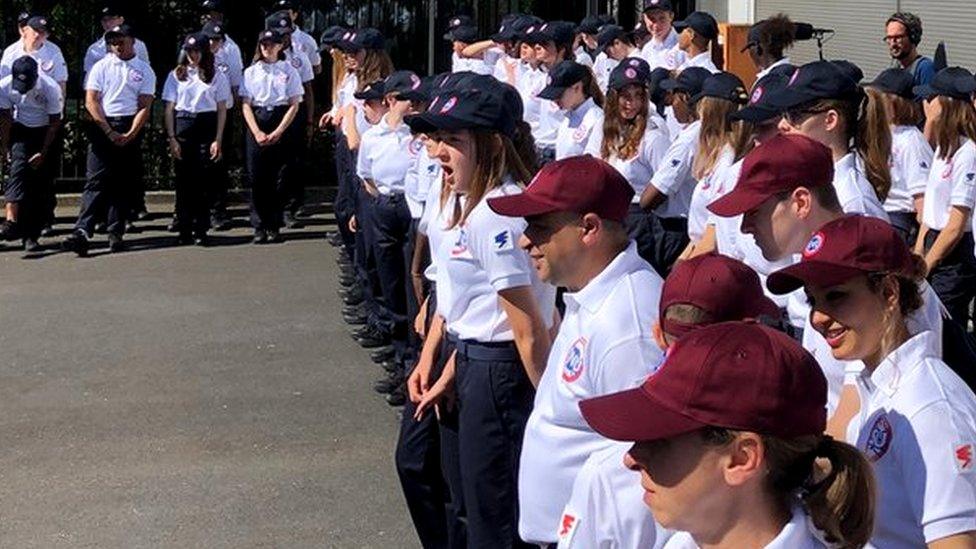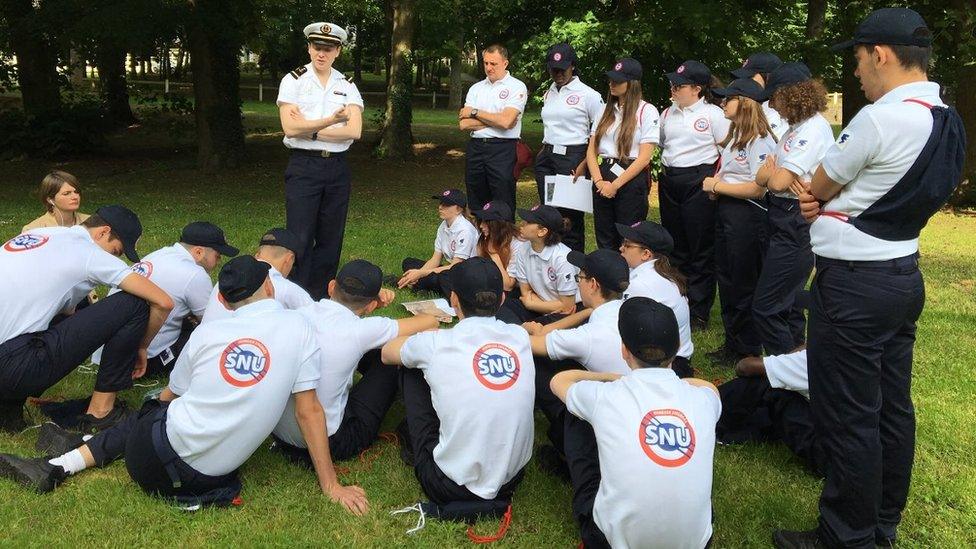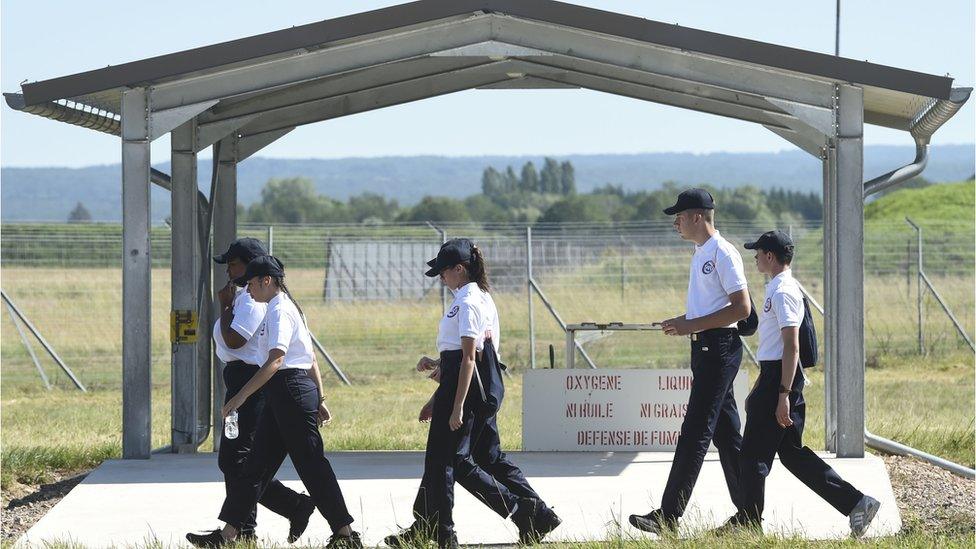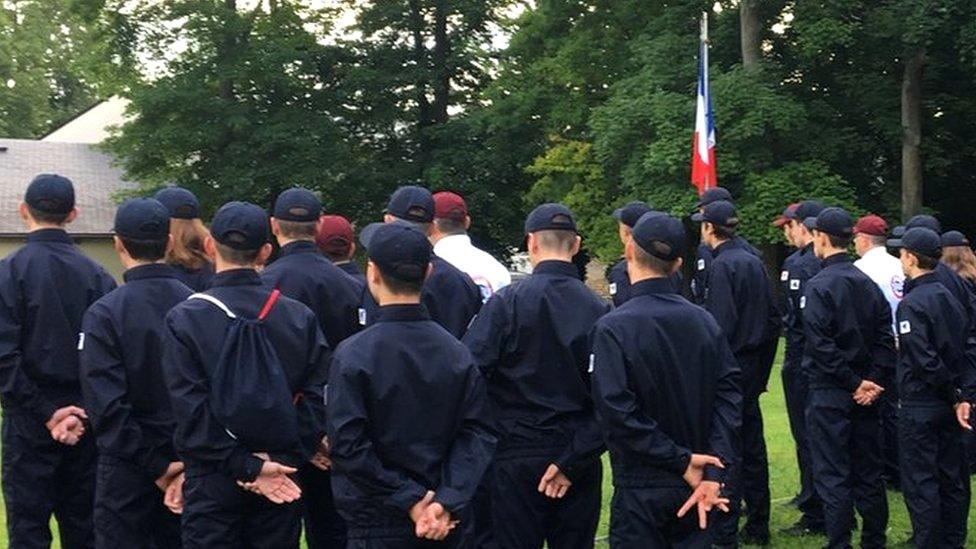France's raw recruits sign up for return of national service
- Published

The first recruits are volunteers, but the SNU national service programme will become compulsory
Across a field outside Paris, a few hundred teenagers slog through the French national anthem in a low murmur.
It's not the liveliest rendition ever heard. But it is only 8am and, lined up on a makeshift parade ground, they are on unfamiliar territory: organised with military precision into straight rows, uniforms correct, for the daily raising of the French flag.
For the first time in 20 years, French teenagers are doing National Service as part of a new scheme introduced by President Emmanuel Macron.
The pilot programme, which is voluntary, includes two weeks of training followed by another two weeks of community work, and will eventually be compulsory for all 16 year olds.

The new regime appears more scout camp than military service
These are the first recruits for the new "Service national universel" (SNU). More scout camp than old-style military service, it includes two weeks of residential training, followed by two weeks of community work.
Mr Macron has said he hopes the programme will boost patriotism and social cohesion among young people in France, but why is he so concerned about French pride and fraternity, and will the new programme help?
What's included?
The president had wanted a more military-style programme, but the army is said to have baulked at the task of training up the nation's teenagers.
Instead the civil scheme includes a day of classes in orienteering, map-reading and strategy, taught by members of the armed forces.

The government aims to bring young French people together from all walks of life
"My dad did military service," a disappointed new recruit complains. "He used to tell me about it. I'd like to do military service like him, but unfortunately it's not possible."
The teenagers here this month are volunteers in a pilot programme, but from 2026 the government plans to make it compulsory for all 16 year olds.
The president says he wants the new programme to boost "patriotism and social cohesion" among young people.
Why does France need it?
"What's missing is a moment of cohesion," explains Gabriel Attal, the junior education minister responsible for launching the scheme, "of youth coming together from different parts of France, from different social backgrounds, sharing their experiences and their commitments for society and the country."
That's one explanation. Another is Marine Le Pen.
President Macron has framed French politics as a battle between himself and the populist, far-right leader, who came first in the European elections last month with her brand of inward-looking nationalism.
Bruno Cautres, a prominent political scientist, says that Mr Macron does not want to leave the field of patriotism to Marine Le Pen.
"What Macron is trying to show to the French public," he says, "is that there is no contradiction in being pro-European and patriotic; to be pro-European and to believe in your country; to be pro-EU and also proud to be French."

Read more French stories

Perhaps then it's not just patriotism President Macron wants to boost, but the "right kind" of patriotism.
If so, is compulsory national service the way to do it?
"It's a very sensitive issue," says Mr Cautres. "Because France is a promise - of liberty, equality, fraternity."
"But when you look at the young French with a low level of education, or the young French with non-French origins, you can see the promise of social and political integration is not really there. So [simply] learning the theory is not going to work."
What do French teens make of it?
Surveys have suggested that a new national service is popular with French voters, but not so much with the teenagers who would have to do it.
For Matteo Comar, a 16-year-old spokesperson for a national student union, Mr Macron's new programme is not only "indoctrination" it's hypocritical too.

French teenagers do not appear as keen on the programme as their elders
"It's funny because the government of today is not at all promoting [the idea of] acting for community.
"The principle of the system is to be selfish - working for yourself, your money. So for them to come and say 'it's about community, we need to share things'. Yes: we agree. But that's not what they're doing at all."
The sense that divisions in France are growing were highlighted again by the recent "gilets jaunes" protests across France.
Will the French president's 'Grand Debate' defuse the yellow-vest protesters' rage?
The challenge, says French sociologist Michel Wieviorka, is how to transform the current social division, crisis and extremism into political democratic debate.
"France [until the 1980s] was an industrial society with a very strong Communist party, a strong working class movement and strong trades unions," he told me.
"There was a relationship between the masters of industry and the working class people. There was a strong conflict, and people had the feeling that this was the core of a collective life and there was a strong cohesion.
"Today, you have many fragments, many different groups, and these groups don't talk, don't discuss."
While many in France feel a sense of national identity fragmenting under the pressures of a changing world, it seems Mr Macron wants to get everyone singing the same tune.